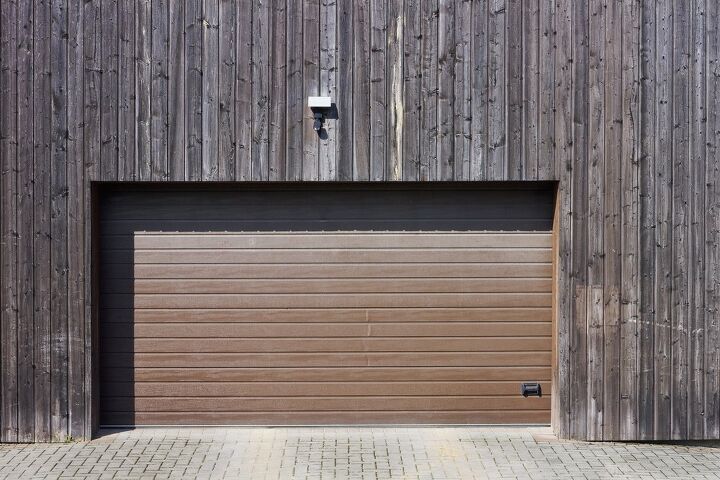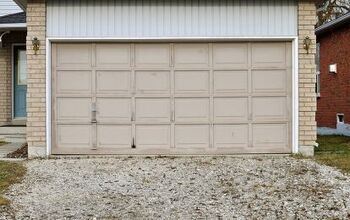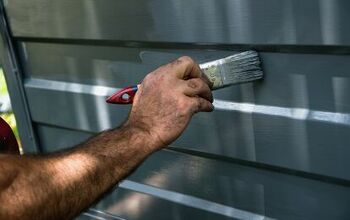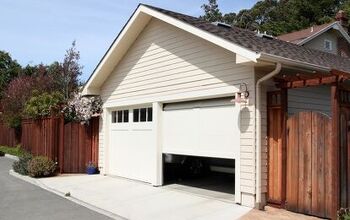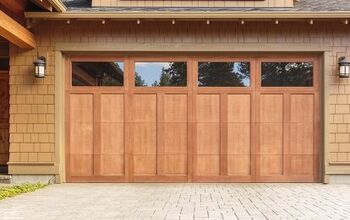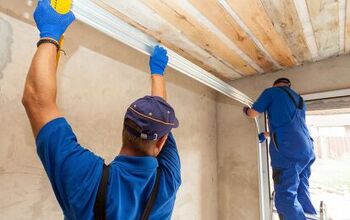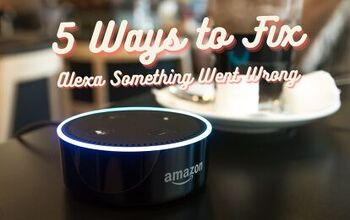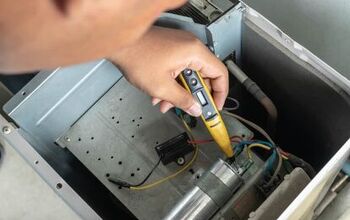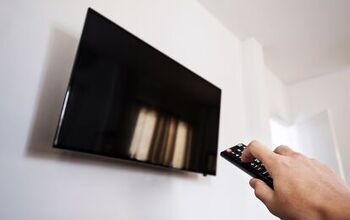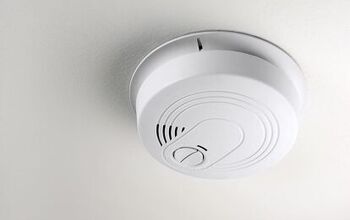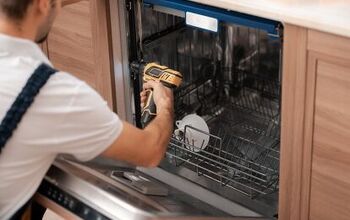Are Garage Door Sensors Universal? (Find Out Now!)

Automatic garage doors get rid of an annoying chore that many of us often have to deal with. They have helped streamline the morning routine for so many of us. Garage doors rely on numerous components to work as expected and those include their sensors.
The sensors on your garage door play an important role in ensuring that it works as intended. So, do you need new sensors if you’re installing a new garage door or are they compatible with all doors?
Not all garage door sensors are universal. Typically, the manufacturers will indicate if their sensors are compatible with all kinds of garage door openers. Make sure you check how compatible the sensors are with your garage door before purchasing them.
Homeowners can only enjoy the convenience afforded to them by garage doors if they are paired with the right sensors. Learn more about selecting the right garage door sensors and other relevant topics by continuing with this article.
Do You Need Garage Door Opener Installation or Replacement?
Get free, zero-commitment quotes from pro contractors near you.

How Do the Garage Door Sensors Work?
Garage door sensors are simple yet remarkably reliable elements of your security system. In order to do their job, garage door sensors are equipped with something known as a photo-eye.
The photo-eye is an infrared sensor that creates an invisible line near the bottom of your garage door. Two photo-eyes must be paired together to create the complete the invisible trip line.
As soon as something hits that infrared trip line, the sensors immediately stop the garage door in its tracks. You must install the sensors about six inches above the ground to ensure they work as intended. At that height, they can detect any body parts, pets, or other objects that may be in the garage door’s path.
The sensors typically stop the garage door from closing all the way before causing them to open up further. Some sensors also have an override function that allows users to close the door even if there’s something in the way.
Are Garage Door Sensors Compatible with All Doors?
Garage doors as well as the openers they’re often paired with usually last for a long time. Still, they won’t last forever. The time may come when you’ll need to install a new garage door along with a new automated opener.
Given how much getting the new garage door and opener likely cost, the desire to save on the sensors is understandable. So, can you continue using your old garage door sensors together with your new garage door? The answer to that question depends on a variety of factors.
Some garage door sensors are labeled as “universal.” That’s what you need to look for if you intend to use the sensors for a long time. Universal sensors can pair with any garage doors you decide to use. Universal garage door sensors are also prized because their performance remains consistent. They will work without fail no matter which garage doors you pair with them.
Now, there are some instances wherein you may be able to continue using the same sensors even if they aren’t universal. Since most garage door makers also offer their own sensors, it’s worth checking how compatible they are.
Keep the old sensors installed after the new garage door is in place and see if they pair up. They may still work if they are made by the same company.
How Can You Tell That Your Garage Door Sensors Are Working?
You can test how well your garage door sensors are working in a variety of ways. Listed below are some of the tests you can try to see if your installed sensors are still in working order.
Check the Lights
Different colored lights will appear on your garage door sensors. The color displayed tells you which sensor you’re looking at. The sensor which displays the green light is the receiving sensor. On the flipside, the sending sensor flashes a yellow light.
The green light is not always visible, but the yellow light should always be illuminated. If the yellow light is out, there may be a problem with your garage door sensors.
Look for Flashing Lights along the Garage Door Setup
The lights on the sensors are not the only reliable indicators of how well the garage door is working. You can also check on the other lights present throughout the whole garage door setup. Check if any lights flash on whenever you use the garage door. Flashing lights coming from the wall panels typically signal that something’s wrong.
Observe How the Garage Door Is Moving
One more way to check how well the sensors are working is to observe the garage door. The garage door may move back and forth if the sensors are acting up. The sensors may also keep the garage door from closing all the way even if there’s nothing blocking it.
What Causes the Garage Door Sensors to Malfunction?
The garage door sensors may not work properly all the time. In this section, we’ll talk about the different things that may cause your garage door sensors to malfunction.
The Garage Door Sensors Are Covered in Dirt and Debris
Since they’re located quite close to the ground, the garage door sensors are prone to getting covered in dirt and debris. You may be tracking mud into your garage with your shoes and splashing it over the sensors accidentally. If your garage door is not sealed, debris could also fly in through the openings and cover the sensors.
Garage door sensors are pretty sensitive. They’ll struggle to work properly if they’re caked in layers of dirt and debris so clean them up regularly.
A piece of soft cloth or even microfiber cloth should be good enough to clean the sensors. Just gently swipe the cloth over the sensors to get rid of the foreign materials in the way.
The Garage Door Sensors Are Misaligned
The issue plaguing your garage door sensors could be something as simple as misalignment. If they aren’t on the same plane, they may not be able to form the invisible trip line.
Use some kind of measuring tool while installing the garage door sensors to ensure they’re at the right height. Taking that extra step could prevent some issues from popping up later on.
The Garage Door Sensors Are Overexposed to the Elements
The elements can damage your garage door sensors. The cold air can leave moisture over the sensors and the heat from the sun isn’t good for them either. All you can really do is wipe the sensors dry because the sunlight is difficult to block out.
The Garage Door Sensors Are Damaged
The garage door sensor may sustain damage if you accidentally kick it or hit it with another object. Gradual wear and tear can also cause the sensor to malfunction. The wires leading to the sensors may also sustain damage.
Should You Repair or Replace Your Malfunctioning Garage Door Sensors?
After noticing that the garage door sensors aren’t working, you will have to decide to either repair or replace them. To make that decision, you should evaluate the reason why the sensors are malfunctioning.
Issues such as the sensors being misaligned can be repaired on your own. You can also repair the sensors even if the issue is related to the wiring. However, you may have to enlist the help of professionals to remedy the wiring issue.
Replacement usually becomes a necessity when the sensors themselves are broken. If you see cracks on the lenses, prepare to look for replacement sensors.
Do You Need Garage Door Opener Installation or Replacement?
Get free, zero-commitment quotes from pro contractors near you.

Related Questions
How Much Do Replacement Garage Door Sensors Cost?
You’ll have to spend a bit of money to acquire replacement garage door sensors. Purchasing the sensors and getting them professionally installed may cost you about $150. Avoid that expense by taking better care of the garage door sensors.
How Should You Maintain the Garage Door Sensors?
Maintaining the garage door sensors is no different from cleaning them up. Just use the soft or microfiber cloth to keep them free from dirt. Do that regularly and the sensors should remain in working condition for a long time.You should also check the wires to see that they’re intact. Keep them organized in order to protect them from fraying or getting tangled.

Gary Evans is passionate about home improvement. He loves finding out how to make improvements in the easiest, most practical, and most affordable ways. Upgrading his home kitchen is one of his ongoing hobbies. Gary is also a long-time content creator and enjoys spending his free time tending to his hydroponic vegetable garden.
More by Gary Evans



